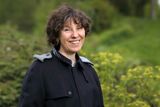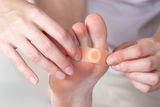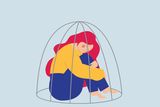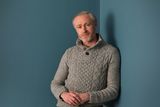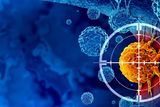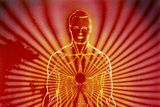Against all odds
As a baby born with Edwards' syndrome, Elaine Fagan was only given days to live, but the 23-year-old has managed to confound all medical expectations, says Joy Orpen
As we trundle along through the 21st century, there are certain givens: we can assume the sun will rise and set and that spring will give way to summer. We can also assume that, in time, we will grow old and die, and, along the way, we may have children who will do the same.
But, for a very small percentage of people, that expectation can be blown to smithereens by the most cruel twist of fate.
'Incompatible with life' is the prognostic euphemism for babies diagnosed with Patau's or Edwards' syndrome. In simple terms, this means the infant will not live long because he or she has a genetic malformation.
All human cells contain two sets of 23 different chromosomes -- one set from each parent -- and these contain the genetic information that's required to be a fully functioning person. However, a very small percentage of babies have three instead of two specific chromosomes. In the case of Patau's syndrome, chromosome 13 (trisomy 13) is affected; and, in Edwards' syndrome, chromosome 18 (trisomy 18) is the problem. Down's syndrome is caused by an extra chromosome 21.
The addition of microscopic pieces of cell material may seem insignificant, but the consequences are often shattering.
Someone who knows this only too well is Michael Fagan. His daughter, Elaine, was born with Edwards' syndrome almost 23 years ago. He says she is the longest-living person with the condition in the world.
He says that, ironically, everything seemed fine when Elaine was born:"My wife Kay and I were delighted as we already had two boys and a girl."
Michael's first inkling that all was not well came when he discovered the baby had a cleft lip, however, he was reassured it could be fixed surgically. The next day, all such comforting illusions were shattered. "The gynaecologist told Kay and I that Elaine was a little Edwards' syndrome baby, and that we wouldn't be taking her home -- she would only live a day or so," says Michael. "His description of the condition was that it was like a car without an engine, gearbox or wheels -- in other words, just a shell. We were absolutely shocked and we cried our eyes out. We had had no warning whatsoever," he recalls.
The problem with babies born with either Edwards' or Patau's syndrome is that they have so many defects they have little hope of survival.
One in 3,000 foetuses is affected by Edwards' syndrome. Some 95 per cent of these will die in the womb.
Of those who are born alive, less than 10 per cent will see their first birthday -- most succumb within the first hours or weeks of birth. Medical complications usually include serious heart, breathing and feeding problems. Brain function is also affected.
Elaine was no exception. "She just had so many problems," explains Michael. "She had heart and respiratory problems. We were so surprised when she survived the first couple of days. Then it was a week, and so on. The nurses and doctors were astounded." Michael says she has survived thanks to the care she gets from her devoted mother and from the wonderful medical teams in Limerick.
Today, this special person is entirely dependent on others for her comfort. Elaine is confined to a wheelchair and does not communicate conventionally. She apparently 'talks' to the family with her eyes, and, as she sits in front of the blazing hearth at home, she smiles and chuckles when amused.
She happily attends St Vincent's Centre in Lisnagry, which is run by the Sisters of Charity. Kay says Elaine has been much more responsive recently, which she believes is due to the work of two new, innovative teachers at the school. "They are fantastic," she says.
But Elaine's beginnings were not so positive. She spent most of her early life in hospital. After four months, her parents decided to take her home.
It was tough going, with one crisis following after another. Then, on St Patrick's Day, just before her first birthday, Elaine had four massive heart attacks in quick succession. It looked like the end when Michael, his father and Father Tom Hannon, a family friend, overheard the doctor saying: "This child is going back to Heaven," before walking out of the room. However, the attending nurse was more hopeful and "started pumping Elaine's chest". Suddenly, the baby opened her eyes and smiled. That was the turning point.
When the Fagans first got the diagnosis, they began a frantic search for information on Edwards' syndrome.
"All we could find out was that there was no survival. Even today, I meet parents who can get no information."
Michael tells the story of a family who were bluntly told to take their baby "home to die" after he was diagnosed with Edwards' syndrome. So, when they heard about Elaine, his family was flabbergasted. They immediately travelled to Limerick to meet her.
"That was only three years ago," says Michael in disbelief. "Yet, they were told to take their baby home to die and were given no support, no information whatsoever." As it transpired, the little boy did not have full-blown Edwards' and is now "having a good life", says Michael.
It is because of this lack of information that the Support Organisation for Trisomy 18, 13, and Related Disorders (SOFT Ireland) was founded in 1991 by a band of "nervous, hurting and apprehensive people" -- all parents of babies with Edwards' and Patau's syndromes.
The Fagans didn't hear about SOFT Ireland until Elaine was three, but they then became hugely committed members, and Michael is now honorary president. One of the critical functions of the organisation is the support the members give one another in dealing with the heart-wrenching situation in which they find themselves.
SOFT also recently published a revised edition of a book called Why Our Baby?, which is packed with critical information that answers all the whys, wheres and whens of this condition.
Has Michael got anything out of his extraordinary journey with his special daughter?
"Before Elaine was born, I was caught up in my own world of business. Having a child like her stops you dead in your tracks," he says. "She has touched so many people. I now know happiness comes from caring and sharing with others. I wouldn't have found that out if I didn't have Elaine. It's thanks to her that I am seeing a lovely side of human nature."
L
For more information, or a free copy of the book 'Why Our Baby?' call SOFT Ireland, tel: (1800) 213-218, email info@softireland.com, or see www.softireland.com
Join the Irish Independent WhatsApp channel
Stay up to date with all the latest news
